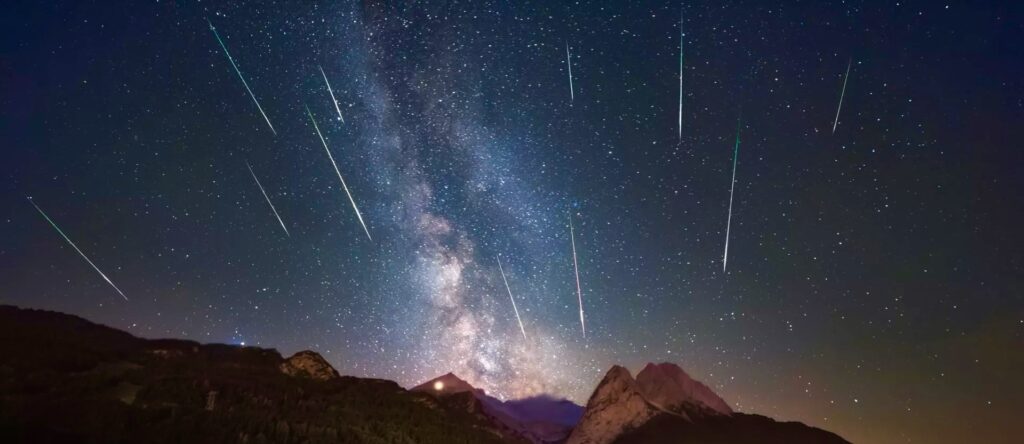With so much chaos in the world – war in the East, division in the West, millions streaming North and South – and the Church, at levels both high and low, experiencing “confusion worse confounded” (“Paradise Lost”), it feels shameful to retreat from battle, even a little, to take in summer.
But we should, because, in truth Jesus has already arranged it that “the strife is o’er,” (ultimately). And grace and redemption fill Creation, which despite our worst efforts, “remains unspent/ There lives the dearest freshness deep down things.” (Hopkins) St. John Henry Newman notes that, especially during barren winter, we have to remember the goodness and beauty that will blossom again beyond all reasonable expectation.
So even as I keep one eye on our troubles, I also try in this season to look less at what’s transient and more at permanent things – and a wider world.
Literally. Especially on summer nights during the Perseid Meteor Shower, which begins tonight and peaks in coming weeks until August 24. No need for special equipment: go outdoors, find the constellation Perseus, and be patient. It will entrance you. (These are also the “dog days,” so you can see Sirius, the “dog star,” the brightest in the sky.)
I find poetry helps too, but tend to stay away from the “Shall I compare thee to a summer’s day” kind of thing. Fine in its way, but just a little too familiar when you’re seeking something really fresh. Here’s an excerpt in that fresher vein from Giacomo Leopardi’s “Night Song of a Wandering Shepherd in Asia,” who says, looking up at the moon and the stars:
Oft as I gaze at thee,
In silence resting o’er the desert plain,
Which in the distance borders on the sky,
Or following me, as I, by slow degrees,
My flocks before me drive;
And when I gaze upon the stars at night,
In thought I ask myself,
“Why all these torches bright?
What mean these depths of air,
This vast, this silent sky,
This nightly solitude? And what am I?”
It’s clear that one reason our sense of the divine has weakened is that we’re closed up too much indoors, looking at screens and social media. Leopardi was a great Italian writer, but also a bitterly self-tortured atheist. Yet even for people like him – let alone for believers – the created world can open us up to heart-swelling experiences (try his L’infinito here).
Complain all you want about the dangers of AI, Meta world, and the screens of all kinds interposing themselves between us and the world, but it’s easy to take countermeasures. Here’s Gerard Manley Hopkins’s cri de coeur at the end of “Inversnaid” (a town he visited on Loch Lomond):
Degged with dew, dappled with dew,
Are the groins of the braes that the brook treads through,
Wiry heathpacks, flitches of fern,
And the beadbonny ash that sits over the burn.
What would the world be, once bereft
Of wet and of wildness? Let them be left,
O let them be left, wildness and wet;
Long live the weeds and the wilderness yet.
All of us who find ourselves in “crabbed youth and age” (Shakespeare), which is most of us these days, can get a little un-crabbed and recover a bit of childlike wonder in the world with a little effort.
Towards that end, do yourself a favor and listen to Dylan Thomas’s “Fern Hill” about his own childhood, as read by Richard Burton (here), which includes this:
And nightly under the simple stars
As I rode to sleep the owls were bearing the farm away,
All the moon long I heard, blessed among stables, the nightjars
Flying with the ricks, and the horses
Flashing into the dark.
And then to awake, and the farm, like a wanderer white
With the dew, come back, the cock on his shoulder: it was all
Shining, it was Adam and maiden,
The sky gathered again
And the sun grew round that very day.
So it must have been after the birth of the simple light
In the first, spinning place, the spellbound horses walking warm
Out of the whinnying green stable
On to the fields of praise.
But the encounter with freshness need not be all high seriousness. Lewis Carroll, of Alice in Wonderland fame – whose day job was mathematics (he also wrote An Elementary Treatise on Determinants) – took breaks from the rigors of numbers with flights of the imagination, even when conveying moral messages. No more so than here:
How doth the little crocodile
Improve his shining tail,
And pour the waters of the Nile
On every golden scale!
How cheerfully he seems to grin,
How neatly spreads his claws,
And welcomes little fishes in,
With gently smiling jaws!
Victorian children were thus delightfully warned about the splendid, friendly, sometimes deceptive appearances in nature – and human nature – a lesson we would all do well to learn again.
In my summer reveries, as I said above, I set limits on the daily din. But I confess that, even in these softer days, I can’t help muttering to myself this hymn of Chesterton’s, for its perfection of form and steely clarity – starting with the Creator of earth:
O God of earth and altar,
bow down and hear our cry,
our earthly rulers falter,
our people drift and die;
the walls of gold entomb us,
the swords of scorn divide,
take not thy thunder from us,
but take away our pride.
From all that terror teaches,
from lies of tongue and pen,
from all the easy speeches
that comfort cruel men,
from sale and profanation
of honour and the sword,
from sleep and from damnation,
deliver us, good Lord!
Tie in a living tether
the prince and priest and thrall,
bind all our lives together,
smite us and save us all;
in ire and exultation
aflame with faith, and free,
lift up a living nation,
a single sword to thee.
__________
















